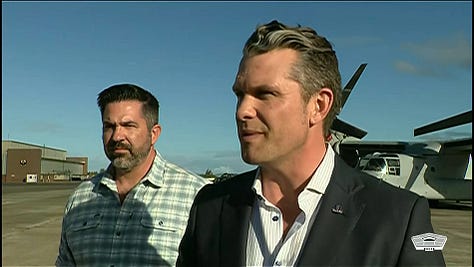


For an administration that conducts so much of its business in propaganda videos (DHS Secretary Kristi Noem, endlessly trailed by a video production crew, posing yesterday in an ICE baseball cap, Rolex, and coiffed tresses in front of a green screen showing footage of Venezuelan men the U.S. had deported to an El Salvador maximum security prison; Defense Secretary Pete Hegseth and his hair gel posing at another military airfield amid M4 assault rifle-lugging security as he blithely lied again about sending classified information on a forthcoming US military operation on a commercial messaging app; masked, plain-clothed immigration officials arresting a Turkish PhD student outside Boston this week, apparently for writing an op-ed criticizing Israel’s Gaza campaign), and with Trump regularly signing executive orders in front of television cameras while chitchatting with reporters for hours, there was something unusually revealing about the Signals group chat of top Trump administration officials discussing the merits of a forthcoming bombing campaign in Yemen that the Atlantic magazine published this week (Part 1, Part 2).
To my mind, it is the most important journalism about the Trump administration second term that has appeared to date. And it is all the more shocking for revealing that there is very little there there, beyond the propaganda videos.
As a journalist covering US foreign policy, I spend hours trying to figure out who is making decisions and where and how decisions are getting made, under the presumption that there are deliberations taking place and it is a matter of trying to find out about them.
The “Houthi PC Small Group” Signals messages that the Atlantic published showed that those deliberations are, to a stunning degree, barely taking place in the Trump administration, even in matters of war, except the way you might debate a news article or TV show with a group of friends, while paying attention to six other things, and making dinner, over the course of a few hours.
They also reveal, as Heather Cox Anderson notes in her Letters from an American Substack today, the stunning degree to which Trump is not involved:
The messages reveal that President Trump was not part of the discussion of whether to make the airstrikes, a deeply troubling revelation that raises the question of who is in charge at the White House. As the conversation about whether to attack took place, Vice President J.D. Vance wrote about Trump’s reasoning that attacking the Houthis in Yemen would “send a message”: “I am not sure the president is aware how inconsistent this is with his message on Europe right now.” Later, he texted to Hegseth: “if you think we should do it let’s go. I just hate bailing Europe out again. …” […]
The decision to make the strikes then appears to have been made by deputy chief of staff Stephen Miller, who ended the discussion simply by invoking the president: “As I heard it,” he wrote, “the president was clear: green light, but we soon make it clear to Egypt and Europe what we expect in return. We also need to figure out how to enforce such a requirement.” […]
“Agree,” Hegseth messaged, and the attack was on.
One former official this week described being stunned not so much about a reporter getting inadvertently added to the chat, but by the Trump administration’s arrogant response to the revelations.
“It’s not the Signal thing specifically, because ‘there but for the grace of G-d,’ the way people get added to email chains…,” the person said. “It’s their response to it that is such a display of intense hubris and … sense that they can do whatever the hell they want.”
“I think that cockiness will lead us to very bad…outcomes with respect to the future of Ukraine, with respect to US/China competition,” and other national security issues, he said.
The cockiness is in large part a result of a Republican-majority Congress that is under tremendous intimidation and pressure right now by Trump and Trump allies like Elon Musk not to fulfill their Constitutional function as a check on the executive branch, a Democratic figure, speaking at a not-for-attribution event, said this week.
“I would say that the environment in which my Senate Republican colleagues operate is one that I have never seen in this country before, in terms of the clear thuggishness and intense pressure that is put on them,” the person said. He added, part of that pressure involves the people around Trump’s ability to through platforms like Twitter to “trigger” the basement dwellers to make violent threats against them and their families. “They can put immense pressure on Republican lawmakers, and they are.”
“There’s plenty of concern from the Republican caucus” at the Trump’s administration’s actions, the person continued. But it is not clear when enough of them in numbers might feel less intimidated and willing to stick their necks out.
Chilling effect
Recent Trump administration executive orders targeting former US officials also have a chilling effect.
A person named in a recent action by the Trump administration targeting former mostly Democratic officials said the actual action had little practical effect. But he thought in the broader context it was meant to try to discourage former US national security experts from speaking out.
“Practically, it doesn’t have relevance,” the person said. “But…I do think there is a sense among people certainly in the national security community of chill on sticking your neck out.”
“And so I think an early chilling effect it has is to manifest less public pushback” than we thought we would see against some of the Trump administration’s actions, he said.
‘The Enemy Within’
Many people in the Trump second term administration are driven by a sense that they are revolutionaries, attacking the “enemy within” America, a foreign policy expert who has been speaking with many Trump administration officials said.
“’The enemy within’ is much more important than anything else,” he said. “It’s not Ukraine, it’s not Taiwan. … As with all revolutions, it's really chaos.”
**



Excellent post. Analysis of the current mess is much better when a journalist isn't being hampered by a timid editor.